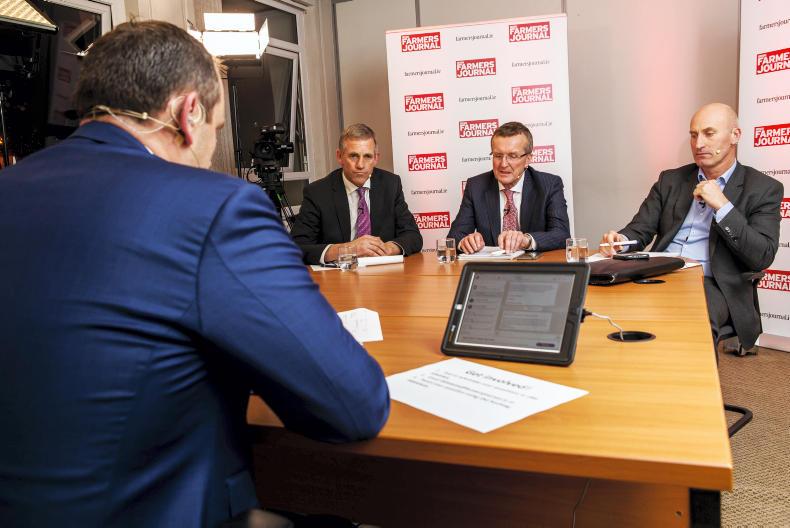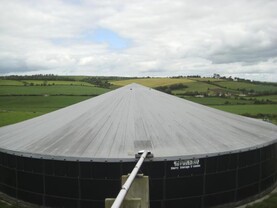Explain upward only convergence
Tim Cullinan: “I didn’t say upward only. What I’m saying is that first of all we have to secure the budget. We have to maintain and look for an increase in the budget. What I’m saying is no more cuts, no more convergence. I don’t support farmers taking any more cuts. I’ve been very clear in that.”
John Coughlan: “The difficulty with convergence in the last reform, it is the efficient farmers that were really hammered. These are the farmers who are working efficiently, who are predominantly family farm units who have seen their income decimated by anything up to 30-40%. I believe that by putting a restructuring scheme in place there is scope then to have upward only convergence. I think it’s the activity on the farm that has to determine CAP payments.”
Angus Woods: “If you look at a lot of the farmers in the beef sector … the reality is an awful lot of beef farmers have seen their payments cut by anything up to 30% (convergence), that’s really significant and the market’s not returning it back to them. You can’t continue to make those cuts on those farms, because what you’re going to do is make farms that are currently viable unviable by continuing down that route.”
Angus Woods: “We need to take a serious look at the wildlife because it’s running around freely and grazing the same ground as the livestock.”
Tim Cullinan said the “real cause” of TB was wildlife and that herds were being taken out because the root problem was not being tackled.
John Coughlan said the compensation was inadequate. He added that there had been “an industry” made from TB testing and that wildlife needed to be tackled.
John Coughlan said we have to look back at the breeding policy “to ensure that we have a calf coming off the cow that can be taken to beef”.
Angus Woods said there have to be multiple solutions for dealing with extra dairy calves, but they need to be controlled and co-ordinated in a proper manner.
Tim Cullinan said: “I think we absolutely have to go down the sexed semen route and to make that efficient we need a lab in Ireland to deal with this.”
The candidates were asked if they would support a minimum inclusion rate of Irish grains into rations, even if it meant higher prices for livestock farmers.
Angus Woods said minimum inclusion rates would be worthy of merit. “If you combine proper labelling with minimum inclusion rates, I think that’s a positive for supporting not just the tillage sector but also the livestock and the dairying sectors as well.”
Tim Cullinan said: “I believe grain farmers have to get a fair price and if it does mean a higher inclusion in feed, so be it. Grain farmers cannot continue at the price they’ve achieved over the last number of years at €130/t and €140/t.”
John Coughlan was asked if he would be happy to pay an extra €10/t for his dairy ration if it had a bit more Irish grain in it. His response was “not unless there was proper labelling first and foremost”.
“We don’t know what’s in a lot of our rations and we don’t know whether it’s imported grain or Irish grain.”
Angus Woods said it is vital that sheep are kept on the hill. “We’re now seeing a scenario where the heather on the hills is getting out of hand and you’ve got the fires, the risk of fire. So we need to keep the hills properly stocked.”
Tim Cullinan said the sheep sector is not going to survive without a payment.
“I think we do need something in the region of €30 per ewe for the highland and the lowland, but we do need an environmental payment to keep sheep on the hills.”
John Coughlan said both hill and lowland sheep sectors are very much aligned together and need to be. “There is no question but the hill sheep sector is a very specialised sector in Irish society in what it does.”
John Coughlan: “The reality is that the suckler farmers are a unique breed in a unique part of the country, that the suckler cow is the animal that has to be kept there. It’s the only animal that is suitable for a lot of the western part of Ireland and we have to maintain that animal there in order to maintain the environment.”
Tim Cullinan: “I think it’s crucial that we maintain the suckler farmer in the west of Ireland and in other parts of the country as well, because they are doing a job.”
Angus Woods: “I’ve been a firm believer right since I’ve come in as livestock chairman to support the suckler cow and support the numbers and the farmer. That’s been my state of policy right from the beginning.”
Tim Cullinan: “There’s parts of the country already that are over-planted. There is concern about that. We also have designated land that is almost worthless at the moment. I think we have to reconsider that and maybe some of that land should be planted.”
John Coughlan: “If you take a lot of the good land in the country, there are pockets of that land that farmers are prepared to plant with individual trees or small groups of trees that will have a huge effect on the environment if they’re allowed to do it.”
Angus Woods: “Having large corporate entities getting paid the same as farmers for planting is not correct because in some areas of the country we’re seeing almost a land grab for planting. I would like to see the money from forestry being spent in the local environment and economy.”
Explain upward only convergence
Tim Cullinan: “I didn’t say upward only. What I’m saying is that first of all we have to secure the budget. We have to maintain and look for an increase in the budget. What I’m saying is no more cuts, no more convergence. I don’t support farmers taking any more cuts. I’ve been very clear in that.”
John Coughlan: “The difficulty with convergence in the last reform, it is the efficient farmers that were really hammered. These are the farmers who are working efficiently, who are predominantly family farm units who have seen their income decimated by anything up to 30-40%. I believe that by putting a restructuring scheme in place there is scope then to have upward only convergence. I think it’s the activity on the farm that has to determine CAP payments.”
Angus Woods: “If you look at a lot of the farmers in the beef sector … the reality is an awful lot of beef farmers have seen their payments cut by anything up to 30% (convergence), that’s really significant and the market’s not returning it back to them. You can’t continue to make those cuts on those farms, because what you’re going to do is make farms that are currently viable unviable by continuing down that route.”
Angus Woods: “We need to take a serious look at the wildlife because it’s running around freely and grazing the same ground as the livestock.”
Tim Cullinan said the “real cause” of TB was wildlife and that herds were being taken out because the root problem was not being tackled.
John Coughlan said the compensation was inadequate. He added that there had been “an industry” made from TB testing and that wildlife needed to be tackled.
John Coughlan said we have to look back at the breeding policy “to ensure that we have a calf coming off the cow that can be taken to beef”.
Angus Woods said there have to be multiple solutions for dealing with extra dairy calves, but they need to be controlled and co-ordinated in a proper manner.
Tim Cullinan said: “I think we absolutely have to go down the sexed semen route and to make that efficient we need a lab in Ireland to deal with this.”
The candidates were asked if they would support a minimum inclusion rate of Irish grains into rations, even if it meant higher prices for livestock farmers.
Angus Woods said minimum inclusion rates would be worthy of merit. “If you combine proper labelling with minimum inclusion rates, I think that’s a positive for supporting not just the tillage sector but also the livestock and the dairying sectors as well.”
Tim Cullinan said: “I believe grain farmers have to get a fair price and if it does mean a higher inclusion in feed, so be it. Grain farmers cannot continue at the price they’ve achieved over the last number of years at €130/t and €140/t.”
John Coughlan was asked if he would be happy to pay an extra €10/t for his dairy ration if it had a bit more Irish grain in it. His response was “not unless there was proper labelling first and foremost”.
“We don’t know what’s in a lot of our rations and we don’t know whether it’s imported grain or Irish grain.”
Angus Woods said it is vital that sheep are kept on the hill. “We’re now seeing a scenario where the heather on the hills is getting out of hand and you’ve got the fires, the risk of fire. So we need to keep the hills properly stocked.”
Tim Cullinan said the sheep sector is not going to survive without a payment.
“I think we do need something in the region of €30 per ewe for the highland and the lowland, but we do need an environmental payment to keep sheep on the hills.”
John Coughlan said both hill and lowland sheep sectors are very much aligned together and need to be. “There is no question but the hill sheep sector is a very specialised sector in Irish society in what it does.”
John Coughlan: “The reality is that the suckler farmers are a unique breed in a unique part of the country, that the suckler cow is the animal that has to be kept there. It’s the only animal that is suitable for a lot of the western part of Ireland and we have to maintain that animal there in order to maintain the environment.”
Tim Cullinan: “I think it’s crucial that we maintain the suckler farmer in the west of Ireland and in other parts of the country as well, because they are doing a job.”
Angus Woods: “I’ve been a firm believer right since I’ve come in as livestock chairman to support the suckler cow and support the numbers and the farmer. That’s been my state of policy right from the beginning.”
Tim Cullinan: “There’s parts of the country already that are over-planted. There is concern about that. We also have designated land that is almost worthless at the moment. I think we have to reconsider that and maybe some of that land should be planted.”
John Coughlan: “If you take a lot of the good land in the country, there are pockets of that land that farmers are prepared to plant with individual trees or small groups of trees that will have a huge effect on the environment if they’re allowed to do it.”
Angus Woods: “Having large corporate entities getting paid the same as farmers for planting is not correct because in some areas of the country we’re seeing almost a land grab for planting. I would like to see the money from forestry being spent in the local environment and economy.”






 This is a subscriber-only article
This is a subscriber-only article









SHARING OPTIONS: